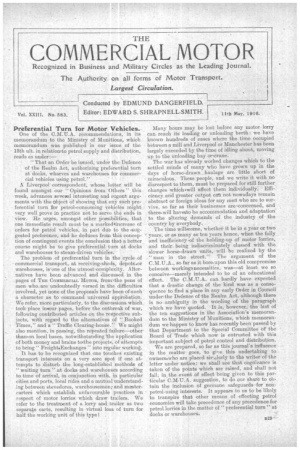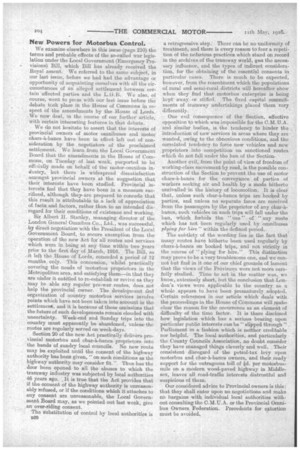Preferential Turn for Motor Vehicles..
Page 1

Page 2

If you've noticed an error in this article please click here to report it so we can fix it.
One of the C.M.TJ.A. recommendations, in its memorandum to the Ministry of Munitions, which memorandum was published in our issue of the 13th ult, in relationito petrol supply and distribution, reads as under " That an Order be issued, under the Defence of the Realm Arct, authorizing preferential turn at docks, wharves and warehouses for commercial vehicles using petrol."
A Liverpool correspondent, whose letter will be found amongst our "Opinions from Others" this week, advances sevemal interesting and cogent arguments with the object of showing that an such preferential turn for petrol-consuming vehicles might very well prove in practice not to serve the ends in view. He urges, amongst other Possibilities, that one immediate result must be a marked4increase of orders for petrol vehicle, in part due to the -suggested preference, and-he deduces from this conception of contingent events the conclusion that a better course might be to give preferential turn at docks and warehouses to steam-driven vehicles.
The problem of preferential turn in the 'cycle of commercial transport, at receiving-sheds, de.pots‘or warehouses, is'one of the utmost.complexity. Alternatives have been advanced and :discussed in the pages of THE COMMERCIAL MOTOR, from-=the pens' of men whoare undoubtedly versed in the difficulties involved, yet none of the proposals have been asue,h a character as to command universal approbation. We refer, more particularly, to the discussions which took place intour pages, before the outbreak of war, following contributed articles Am the 'regpective subjects, with regard to the alternatives of `.` Booked Times," and a "Traffic Clearing-house." We might also mention, in passing, the repeated failure—other thamon local bases, notwithstanding 'the application of both money and brains torthe projects, of attempts to bring " Freight/Exehanges " into regular working.
It has to be recognized that one touches existing transport interests on a very sore spot if one attempts to disturb the long-established methods of "waiting turn" at docks and warehouses according to time of arrival, in conjunction with, in particular cities and ports, local rifles and a mutual understanding between stevedores, warehousemen e and mastercarter S which establish unfavourable practices in respect of motor lorries which draw trailers. We refer to the treatment of a lorry and trailer as two separate carts, resulting in virtual loss of turn for half the working unit of this type I . Many hours may be lost before any motor-lorry can reach its loading or unloading berth: we have known hundreds of cases where the time occupied between a mill and Liverpool or Manchester has been largely exceeded by the time of idling about, moving up to the unloading bay oricrane. The war has already worked changes which to the settled minds of many who have grown up in the days of horse-drawn haulage are little short of miraculous. These .people, andwe write it with no disrespect to them, must be prepared for still further • 'changes which /will -affect them individually. Efficiency and greater output cren not nowadays remain abstract or foreign ideas for any men who are to survive, so far as their businesses are 'concerned, and ther&will havato be accommodation and adaptation to the altering demands of the industry of the Country by everybody...
The time will/come, whether it be in a year or two years; or as many as:ten years hence, when the folly and inefficiency -of the holding-up of motor lorries, and their being •indiscriminately classed with the slower horse-drawn units, will be realized by the "man in the street." The argument of the so far as it hore,upon this old compromise between workinonecessities, was—at least we so conceive—merely intended to be of an educational effect. The C.M.U.A.• can hardly have expected that a drastic change of the kind was as a consequence to find a place in any early Order in Council underthe Defence of -the Realm Act, although there is no ambiguity in the wording of the paragraph which we have quoted. It is, however, the last of the ten suggestions in the Association's memorandum to the Ministry of Munitions, which memorandum we happen to know has recently been passed by that Department to the Special Committee of the Board Of Trade which now is entrusted with this important subject of petrol control and distribution. We are prepared, so far as this journal's influence in the matter goes, to give this undertaking to owners&who are placed sir-duly to the writer Of the letter under notice: we shall see that cognizance is taken of the points which are raised, and shall not fail, in the event of effect being given to this particular C.M.U.A. suggestion, to do our share to obtain the inclusion of germane safeguards for nonpetrol-using interests. It appears to us to be' likely to transpire that other means of effecting petrol economies will take precedence of any precedence for petrol lorries in the matter of "preferential turn" at docks or warehouses. .
New Powers for Motorbus Control.
We examine elsewhere in this issue (page 210) the terms and probable. effects of the so-called war legislation under the Local Government (Emergency Pro .. visions) Bill, which Bill has already received the Royal assent. We referred to the same subject, in our last issue, before we had had the advantage or opportunity of acquainting ourselves with all the circumstances of an alleged settlement between certain affected parties and the L.G.B. We also, of course, went to press with our last issue before the debate took place in the House of Commons in re _ spect of the amendments by the House of Lords.. We now deal, in the course of our further article, with certain interesting features in that debate.
We do not hesitate to assert that the interests of provincial owners of motor omnibuses and motor chars-a-bancs hare been in effect left out of consideration by the negotiators of the proclaimed settlement. We learn from the Local Government Board that the amendments in the House of Commons', on Tuesday of last week, purported to be offieially made on behalf of the motor-omnibus industry, but there Is widespread dissatisfaction . amongst provincial owners at the suggestion that their interests have been studied. Provincial interests feel that they have been in a measure sac, rificed, although they are prepared to concede that . this eesult is attributable to a lack of appreciation , of facts_ and factors, rather than to an intended disregard for their conditions of existence and working. Sir. Albert H. Stanley, managing director of the London. General Omnibus Co., Ltd., was successful, b-y direct negotiation with the President of the Local Government Board, to secure exemption from the . operation of the new Act for all routes and services which were in being at any time within two years prior to the first day of March, 1916. The Bill, as left the House of Lords, conceded a period of 12 months only. This concession, whilst practically covering the needs of motorbus proprietors in the Metropolitan area, and satisfying them—in that they are uiader it entitled to re-establish or revive as they may be able any regular pre-war routes, does not help the provincial. owner. The development tind organization of country motorbus services involve points which have not been taken into account in the settlement, and it is because of these omissions that . the future of such developments remain clouded with uncertainty. Week-end and Sunday trips into the country must apparently be abandoned, unless, the routes are regularly served on week-days. • Section 20 of the new Act practically delivers provincial motorbts and char-h-bancs 'proprietors, into the hands of sundry local councils. No new route may be exploited .until the consent of the highway authority has been given, "on such conditions as the highway authority may consider fit." Thus has the door been opened to all the abuses to which the tramway industry was subjected by local authorities 46 years ago. It is true that the Act provides that if the consent of the highway authority is unreasonably refused, or if the conditions which it attaches to any consent are unreasonable, the Local Government Board may, as we pointed out last week, give an over-riding consent.
The substitution of control by local authorities is a retrogressive step. There can be no uniformity of treatment, and there is every reason to fear a repetition of the nefarious practices which stand on record in the archives of the tramway world, qua the necessary influence, and the types of indirect consideration, for the obtaining of the essential consents in particular cases. There is much to be expected, however, from the resentment which the populations of rural and semi-rural districts will hereafter show when they find that motorbus enterprise is being kept away or stifled. The fixed capital commitments of tramway undertakings placed them very differently. • One evil consequence of the Section, effective opposition to which was impossible for the C.M.U.A. and similar bodies, is the tendency to hinder the introduction of new services in areas where they are wanted, owing to the obnoxious conditions, and the correlated tendency to force new vehicles and. new proprietors into competition on sanctioned routes -which do not fall under the ban of the Section.
Anotherevil, from the point of view of freedom of working-class movement by road, is the possible construction of the Section to prevent the use of motor chars-it-banes for the conveyance of parties of workers seeking air and health by a mode hitherto unrivalled in the history of locomotion. It is clear that, unless such char-h-bancs trips are booked by parties, and unless no separate fares are received from the passengers by the proprietor of any char-abanes, such vehicles on such trips will fall under the ban, which forbids the "use" of' "any . route which has not been regularly used by omnibuses plying for hire" within the defined period.
The subtlety of the wording lies in the fact that many routes have hitherto been used regularly by chars-a-bancs on booked trips, and not strictly in the course of "plying for hire." This distinction may prove to be a very troublesome one, and we cannot but findin it one of our chief grounds of lament that the views of the Provinces were not more carefully studied. ,Tie to act in the matter was, we 'know, extremely short, but the conclusion that-London's views were applicable to the country as a whole appears to, have been Prematurely adopted. Certain references in our article which deals with the proceedings in the House of Commons will make clear the reason for the occurrence as an element of difficulty of the time factor. It is there disclosed how legislation which has a serious bearing upon particular public interests can be "slipped through" Parliament in a fashion which is neither creditable nor helpful. The local authorities, and particularly' the County Councils .Association, no doubt consider they have managed things cleverly and well. Their consistent disregard of the petrol-tax levy upon motorbus and char-h-bancs owners,. and their ready support for the outrageous toll of O. per motorbusmile on a modern wood-paved highway in Middlesex, leaves all road-traffic interests distrustful and suspicious of them.
Our considered advice to Provincial owners is this : that they shall enter upon no negotiations and make no bargains with individual local authorities without consulting the C.M.U.A. or the Provincial Omnibus Owners Federation. Precedents for extortion must be avoided..




















